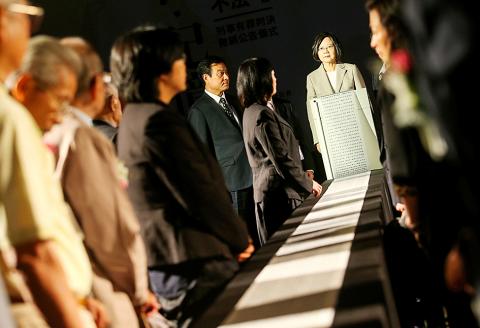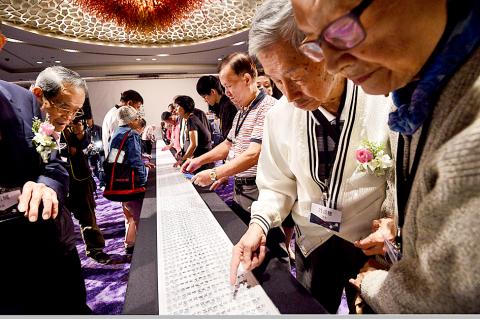The Transitional Justice Commission yesterday exonerated 1,270 people who were convicted after the 228 Incident, with commission Chairman Huang Huang-hsiung (黃煌雄) touting the move as “a small, but significant step toward realizing transitional justice.”
The commission held a news conference at the Sheraton Grand Taipei Hotel, which was attended by people who were wrongfully or unjustly tried during the White Terror era, as well as family members of those who have died.
President Tsai Ing-wen (蔡英文), Premier William Lai (賴清德), Legislative Speaker Su Jia-chyuan (蘇嘉全) and Control Yuan President Chang Po-ya (張博雅) also attended the news conference, which featured speeches by people affected by the 228 Incident and the White Terror era.

Photo: CNA
Chung Yi-jen (鍾逸人), 98, said he was arrested during the 228 Incident when he was 26 for trying to protect his hometown of Taichung against the “corrupt” officials and troops Chiang Kai-shek (蔣介石) sent from China, who “bullied and slaughtered” Taiwanese.
“I did not break the law. I was just a Taiwanese trying to defend his country,” Chung said, expressing his gratitude to Tsai for “restoring people’s reputations.”
The Chinese Nationalist Party (KMT) gained control of Taiwan after World War II and in 1947 sparked the 228 Incident, which ushered in the White Terror era after Chiang dispatched legions of troops to Taiwan to quash the uprising.

Photo: Peter Lo, Taipei Times
Chiang in 1949, the same year he imposed martial law, retreated to Taiwan with the KMT after its defeat in the Chinese Civil War.
Wu Sheng-jun (吳聲潤), who was sentenced to 12 years in prison for making grenades for a rebel group, said he still weeps when he thinks about his lost friends, who were bludgeoned to death by the then-KMT regime, many of whom he said loved their country and were outstanding people.
Wu, 95, said the US saved Chiang’s life by deploying the US Seventh Fleet to help defend Taiwan after the Korean War, but Chiang was arresting and killing Taiwanese.
Wu thanked Tsai and the “indigenous” government she leads for repealing the unjust convictions imposed on “ill-fated” Taiwanese who until then had been living in disgrace.
Taiwan experienced a dark age before it was democratized, with some people not understanding why they were interrogated or were to be executed, Tsai said.
“Many people and their families spent most of their lives in the hope of redress,” Tsai said. “Although the government conferred certificates to warrant the restoration of their reputations, the erroneous convictions were never repealed.”
Apologizing to those who did not live to witness their exoneration, as well as their families, Tsai said the day came late, “but it is better late than never.”
The president thanked the Legislative Yuan for passing the Act on Promoting Transitional Justice (促進轉型正義條例), without which the exonerations could not have been granted.
She called on the commission to continue to solemnly and steadfastly perform its duties of redressing judicial injustices, attributing responsibility for past injustices and establishing historical facts to “regain the public’s trust.”
“Democracy will not take a backward step and neither will transitional justice,” Tsai said.
“Only by persistently learning history’s lessons can we truly move toward reconciliation,” she said.
Due to legal restrictions imposed by Article 9 of the National Security Act (國家安全法) and interpretations delivered by the Council of Grand Justices, crimes people were convicted of during the authoritarian period could not be annulled, the commission said.
However, thanks to the transitional justice act, the convictions can be repealed after the cases are published by the authorities, the commission said.
Yesterday’s exonerees were mostly accused of espionage or rebellion against the government during the Martial Law era, the commission said, adding that the Executive Yuan had published their names in a gazette on its Web site.
The exonerations marked the first set in a series of three, with about 10,000 more people to be exonerated, Huang said.
While the first batch represented just a small step, Huang said he hoped it would prove to be a significant step for the quest for transitional justice.
Statistics released by the commission showed that 1,216 men and 54 women were exonerated yesterday, including 274 who were executed.

The CIA has a message for Chinese government officials worried about their place in Chinese President Xi Jinping’s (習近平) government: Come work with us. The agency released two Mandarin-language videos on social media on Thursday inviting disgruntled officials to contact the CIA. The recruitment videos posted on YouTube and X racked up more than 5 million views combined in their first day. The outreach comes as CIA Director John Ratcliffe has vowed to boost the agency’s use of intelligence from human sources and its focus on China, which has recently targeted US officials with its own espionage operations. The videos are “aimed at

STEADFAST FRIEND: The bills encourage increased Taiwan-US engagement and address China’s distortion of UN Resolution 2758 to isolate Taiwan internationally The Presidential Office yesterday thanked the US House of Representatives for unanimously passing two Taiwan-related bills highlighting its solid support for Taiwan’s democracy and global participation, and for deepening bilateral relations. One of the bills, the Taiwan Assurance Implementation Act, requires the US Department of State to periodically review its guidelines for engagement with Taiwan, and report to the US Congress on the guidelines and plans to lift self-imposed limitations on US-Taiwan engagement. The other bill is the Taiwan International Solidarity Act, which clarifies that UN Resolution 2758 does not address the issue of the representation of Taiwan or its people in

US Indo-Pacific Commander Admiral Samuel Paparo on Friday expressed concern over the rate at which China is diversifying its military exercises, the Financial Times (FT) reported on Saturday. “The rates of change on the depth and breadth of their exercises is the one non-linear effect that I’ve seen in the last year that wakes me up at night or keeps me up at night,” Paparo was quoted by FT as saying while attending the annual Sedona Forum at the McCain Institute in Arizona. Paparo also expressed concern over the speed with which China was expanding its military. While the US

SHIFT: Taiwan’s better-than-expected first-quarter GDP and signs of weakness in the US have driven global capital back to emerging markets, the central bank head said The central bank yesterday blamed market speculation for the steep rise in the local currency, and urged exporters and financial institutions to stay calm and stop panic sell-offs to avoid hurting their own profitability. The nation’s top monetary policymaker said that it would step in, if necessary, to maintain order and stability in the foreign exchange market. The remarks came as the NT dollar yesterday closed up NT$0.919 to NT$30.145 against the US dollar in Taipei trading, after rising as high as NT$29.59 in intraday trading. The local currency has surged 5.85 percent against the greenback over the past two sessions, central